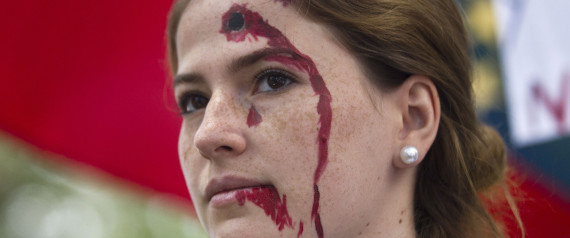Three more people were reported killed in Venezuela’s political unrest as both supporters and opponents of President Nicolas Maduro took to the streets in new shows of force Saturday.
A man identified as Jesus Orlando Labrador died from a gunshot wound in the chest Saturday in the southwestern city of Merida, Mayor Carlos Garcia told The Associated Press. He said it happened when a suspected group of hard-line government supporters began shooting at anti-government protesters.
Another victim, Argenis Hernandez, was shot in the stomach Friday by an angry motorist as he and other protesters manned a barricade on a highway outside Valencia, Venezuela’s third-largest city and a major focal point of protests against Maduro. He died at a hospital before dawn Saturday, local officials said.
In San Cristobal, the city where the wave of unrest began, bus driver Wilfredo Rey was fatally shot Friday night after a group of Maduro supporters roared into an anti-government neighborhood on motorcycles and began firing indiscriminately, said Sergio Vergara, who has headed the local government since Mayor Daniel Ceballos, an outspoken critic of the president, was arrested last week on charges of fomenting violence.
More than 30 people have been killed during five weeks of clashes between protesters and security forces who are sometimes joined by motorcycle-riding civilians loyal to Maduro’s socialist government. Hundreds more have been wounded and arrested.
The threat of violence didn’t deter tens of thousands of anti-government activists from marching peacefully in Caracas and other cities Saturday to demand an end to the use of force against dissents by what opponents have taken to calling Maduro’s “dictatorship.”
The demonstrations came a little more than a month after the arrest of Leopoldo Lopez, a leading voice of the opposition who was charged with conspiracy and arson tied to the first deadly protests.
A member of Lopez’s Popular Will party, Carlos Vecchio, addressed the crowd in defiance of an arrest order while Lopez’s wife, Lilian Tintori, read a letter penned from jail by her husband in which he calls on Maduro to resign and open the door to national reconciliation.
“Maduro, I want to tell you, and those who are with you, if you don’t step aside, you’ll have millions of Venezuelans on the streets and beyond fighting for the political change we deserve,” the letter said.
In what’s become a familiar coda to almost-daily demonstrations by the opposition, security forces fired tear gas and water cannons to drive off a few dozen students who tried to block a Caracas highway after most protesters went home. There were no immediate reports of injuries.
Across town, Maduro addressed a much smaller rally called by loyalist students to complain about arson attacks that have kept several universities shut for weeks.
Maduro, the hand-picked successor of the late President Hugo Chavez, has denounced the protests as part of a U.S.-backed, “fascist” conspiracy to stir up violence and oust him just a few months after his party prevailed in nationwide municipal elections.
“These Chuckys are direct descendants of the Nazis,” Maduro told the cheering crowd, referring to the diabolical toy doll of Hollywood horror movie fame that has become his favorite term to taunt his opponents.
With both sides showing no signs of backing off, the political balance increasingly hangs on the course of economy, which is struggling despite high prices for oil that account for more than 90 percent of Venezuela’s exports. Many economists are forecasting a recession this year, with no end in sight for widespread shortages of basic goods and galloping inflation that hit 57 percent in February.
The protests have exacerbated the economic woes, forcing businesses to shutter for fear of violence and even leading Air Canada to suspend flights to the country. Maduro on Friday estimated damage caused by the protests at $10 billion. [AP]



